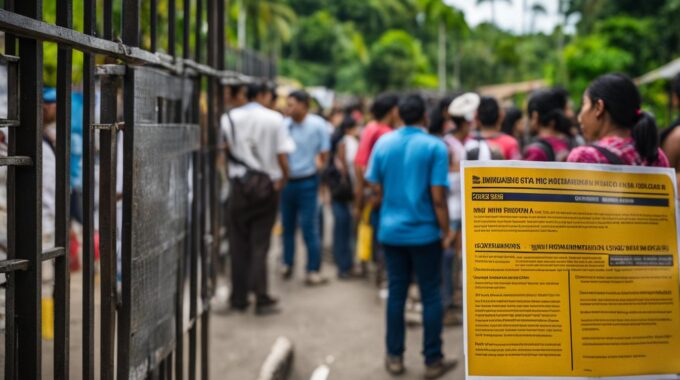At the forefront of property financing in Costa Rica, GapInvestments.com stands as a beacon for…

Guide to Understanding Costa Rica Immigration Quotas
Moving to Costa Rica is a popular choice for expats looking to retire, study, or live in a tropical paradise. The country offers surfable beaches, natural beauty, and abundant wildlife, making it an exciting destination for adventure seekers. The cost of living in Costa Rica is considerably lower than in the United States, with consumer prices, rent prices, restaurant prices, and grocery prices all being more affordable. Housing in Costa Rica is relatively affordable, with the average rent for a one-bedroom apartment ranging from $332 to $485 per month.
The safety in Costa Rica is fairly good, although travelers are advised to exercise caution and practice common sense precautions. The weather in Costa Rica is warm and tropical, with a dry season from December to April and a rainy season from May to November. The country offers a high quality of life, ranking as one of the happiest countries in the world with beautiful beaches, a stable democracy, and an educated population. Healthcare in Costa Rica is excellent, with access to universal healthcare and relatively low costs compared to the U.S.
When it comes to immigration requirements, U.S. and Canadian citizens do not need a visa to visit Costa Rica as tourists, but long-term residents have various visa options, including the Pensionado Program, Rentista Program, and Inversionista Program. There are also plans to introduce a digital nomad visa for qualified foreign nationals. Overall, moving to Costa Rica offers a plethora of benefits and opportunities for expats.
Key Takeaways:
- Costa Rica offers a lower cost of living compared to the United States.
- The country has a warm and tropical climate, with a high quality of life.
- Healthcare in Costa Rica is excellent and affordable.
- U.S. and Canadian citizens do not need a visa to visit Costa Rica as tourists.
- Long-term residents have various visa options available, including the Pensionado Program, Rentista Program, and Inversionista Program.
Cost of Living in Costa Rica
The cost of living in Costa Rica is significantly lower than in the United States. Consumer prices, rent prices, restaurant prices, and grocery prices are all considerably lower, making it more affordable for expats to live in the country. According to International Living, a single person can live on between $1,400 and $1,700 per month, while retired couples can live well on $2,000 per month and even better on $2,500 to $3,000 per month. However, the cost of living may vary depending on lifestyle choices and location in popular tourist destinations. Overall, Costa Rica ranks among the best countries for retirement due to its affordability.
Below is a table that compares the cost of living in Costa Rica with the United States:
| Expense | Cost in Costa Rica | Cost in the United States |
|---|---|---|
| Consumer Prices | $ | $$ |
| Rent Prices | $ | $$ |
| Restaurant Prices | $ | $$ |
| Grocery Prices | $ | $$ |
Note: The dollar signs ($) represent the relative cost, with $ being more affordable and $$ being more expensive.
Living in Costa Rica not only offers a lower cost of living but also provides access to beautiful beaches, stunning natural landscapes, and a welcoming culture. With its warm climate, abundant wildlife, and high quality of life, it’s no wonder that Costa Rica is a popular destination for expats seeking an affordable and enjoyable retirement.
Immigration Requirements for Costa Rica Residency
When considering a move to Costa Rica, it is essential to understand the immigration requirements for obtaining residency. U.S. and Canadian citizens can enter Costa Rica as tourists without a visa, but for long-term stay, temporary residency is necessary. There are several visa options available to meet the requirements for residency.
Pensionado Program
The Pensionado Program is designed for retirees and requires proof of receiving at least $1,000 per month from a pension source. This program offers a straightforward path to residency for individuals who have retired and receive a regular pension.
Rentista Program
The Rentista Program is suited for individuals who do not have a pension but can demonstrate a monthly income of at least $2,500 for two years. Alternatively, applicants can deposit $60,000 in a Costa Rican bank as proof of financial stability. This program allows individuals to obtain residency based on their financial resources.
Inversionista Program
The Inversionista Program offers residency to individuals who invest at least $200,000 in property, shares, or business projects in Costa Rica. This program is suitable for those looking to contribute to the country’s economy through their investments.
In addition to the above programs, Costa Rica is planning to introduce a digital nomad visa for qualified foreign nationals. This visa will allow individuals to stay in the country legally for up to one year while earning income remotely. The requirements for the digital nomad visa include a stable income of $3,000 per month or $5,000 for those with a spouse or family.
Document Requirements
Regardless of the chosen residency program, certain documents are required for the application process. These may include birth certificates, bank statements, criminal records, and other supporting documents to establish eligibility for residency.
Understanding the immigration requirements and visa options for residency in Costa Rica is crucial for individuals considering a move to the country. Whether through the Pensionado Program, Rentista Program, Inversionista Program, or the upcoming digital nomad visa, obtaining residency offers expats the opportunity to experience the beauty and benefits of Costa Rica’s tropical paradise.
Conclusion
Moving to Costa Rica offers a myriad of benefits for those considering a new place to call home. With its lower cost of living, high quality of life, and excellent healthcare, the country attracts expats from around the world. However, understanding the immigration requirements and visa options is crucial for a smooth transition.
U.S. and Canadian citizens can enter Costa Rica as tourists without a visa, but if planning to stay long-term, they must comply with the country’s temporary residency requirements. The Pensionado Program, Rentista Program, and Inversionista Program are all viable options for obtaining residency in Costa Rica. Each program has its own specific criteria, such as a minimum monthly income or investment, which applicants must meet.
Furthermore, there are plans to introduce a digital nomad visa, catering to remote workers looking to relocate to Costa Rica. This visa will provide legal stay in the country for up to one year while earning income remotely. Having a stable income is essential for this visa, with a minimum requirement of $3,000 per month, or $5,000 for those with a spouse or family.
Whether it’s the allure of Costa Rica’s tropical climate, stunning scenery, or welcoming culture, many are drawn to the idea of moving to this beautiful country. By understanding the immigration process, including quotas and residency requirements, individuals can navigate the journey to living in Costa Rica with ease.
FAQ
What is the cost of living in Costa Rica?
The cost of living in Costa Rica is significantly lower than in the United States. Consumer prices, rent prices, restaurant prices, and grocery prices are all considerably lower, making it more affordable for expats to live in the country.
How much does it cost to rent an apartment in Costa Rica?
The average rent for a one-bedroom apartment in Costa Rica ranges from $332 to $485 per month.
Is Costa Rica a safe country to live in?
The safety in Costa Rica is fairly good, although travelers are advised to exercise caution and practice common sense precautions.
What is the weather like in Costa Rica?
Costa Rica has a warm and tropical climate, with a dry season from December to April and a rainy season from May to November.
What are the visa requirements for living in Costa Rica?
U.S. and Canadian citizens do not need a visa to visit Costa Rica as tourists. However, for long-term residency, there are several visa options available, including the Pensionado Program, Rentista Program, and Inversionista Program.
Can I get universal healthcare in Costa Rica?
Yes, Costa Rica offers access to universal healthcare, which is of high quality and relatively low cost compared to the U.S.
How can I become a digital nomad in Costa Rica?
Plans are underway to introduce a digital nomad visa for qualified foreign nationals, allowing them to stay in the country legally for up to one year while earning income remotely. The digital nomad visa requires a stable income of $3,000 per month, or $5,000 for those with a spouse or family.


